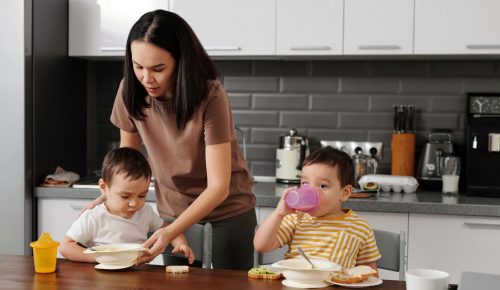Published: February 2024
Bibliographic reference: Chacón, V., Chung, M., Folta, S. C., Hennessy, E., Macfarlane, H., Roberto, C. A., Tovar, A; Wilson, NLW; Economos, C. D. (2024). The longitudinal association between caregivers' perceived competence and autonomy and children's dietary consumption before and 10 months into the COVID-19 pandemic. Appetite, 195, 107205. https://doi.org/10.1016/j.appet.2024.107205
Abstract
The COVID-19 pandemic has been stressful, potentially affecting caregivers’ feeding choices. Caregivers play a role in shaping children’s diets, yet few studies have explored how their competence and autonomy, defined by the Self-Determination Theory, impact children’s diets. We examined the relationship between caregivers’ autonomy and competence and their feeding practices before and during the first year of the pandemic. A national convenience sample of caregivers with 3-12-year-old children completed an online survey during two time-periods. Questions adapted from the Intrinsic Motivation Inventory measured perceived competence and autonomy for feeding fruits and vegetables (F/V) and limiting sugar-sweetened beverages (SSBs) and desserts. National Health and Nutrition Examination Survey Dietary Screener questions measured children’s consumption of F/V, SSBs, and desserts. Paired t-tests examined how child consumption and caregiver’s perceived competence and autonomy changed, and logistic regressions examined whether caregivers’ competence and autonomy predicted the change in child consumption and if changes in competence and autonomy were associated with changes in child consumption. Caregivers (n = 597) were mostly Black/African American (33.0%) or Latina/o/x (42.7%) and older than 30 years (84.1%). Children’s consumption did not change overall, but caregivers’ competence for feeding F/V increased, and their competence for limiting SSBs and desserts decreased. Caregiver competence and autonomy before COVID-19 did not predict child dietary consumption during the pandemic. However, change in competence was a significant predictor of the change in child consumption of F/V [OR (95%CI): 0.70 (0.57, 0.86)]. The association between caregiver’s perceived competence for feeding F/V and child consumption remained positive and significant in both periods [OR (95%CI) pre and during COVID: 2.09 (1.69, 2.57) – 2.40 (1.88, 3.06)]. This study can inform behavioral interventions supporting caregivers’ competence and autonomy around feeding choices.

